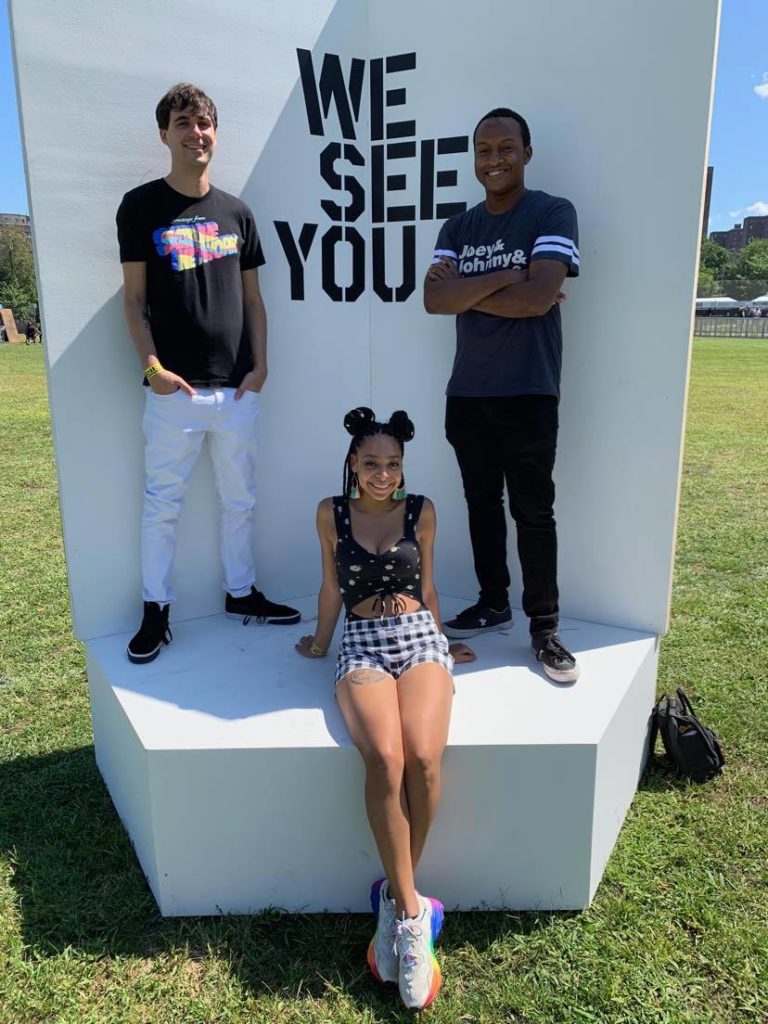Video Premiere: babygotbacktalk – “Back to Before”
Posted: by The Alt Editing Staff

babygotbacktalk are politically charged and unapologetically punk. Their debut single off of their upcoming record, Genre Reveal Party, serves up a sweet taste in “Back to Before” where listeners can digest some of the most conscious and intentional music released in 2020.
Lead by G’Ra Asim, Rhiana Hernandez, and Jake Lazaroff, the New York-based band aims to blend the best pieces of their favorite music while sharing meaningful messages about the way they’ve come to see America and the people in it. “Back to Before” is a first step into understanding how regressive politics have been normalized, and the band’s pushback against the persona of it all, Uncle Sam.
babygotbacktalk sat down to talk about their songwriting style, their values as a band, the timing of their release, and more.
Check out the video and interview below:
The Alternative: Tell me about the songwriting process for you for “Back to Before?” How did you approach this one?
Jake Lazaroff: Most of the songs start with an idea. Like G’ra brings to the table at a practice space that we’d all physically collaborate when we could be within 6 feet of each other. Usually that’s initially with a riff or maybe a chorus. We get a laptop and usually track the initial bones of it, like the bones of it with basic drums and guitars, then start messing around with that. That’s the demoing process, I guess.
G’Ra Asim: Instrumentally, a pattern in our songwriting that we’ve really tried to embraces is that if you think of punk as a giant umbrella with a bunch of other camps beneath it. One thing that I think that’s fun about our band is that we tend to combine some of those sub-genres in ways that are not completely familiar. So we’ll try to incorporate like a verse that has a 90’s Fat Wreck feel to it in some way and we’ll also throw in a tapping guitar riff over it which is something you’d usually more associate with math rock or with emo. And then because you know, we’re babygotbacktalk, on top of that verse with a tapping riff, we’ll add a soaring violin lick halfway through the verse so that the song can sort of hit some familiar notes but put them in a sequence or combination that is hopefully more refreshing than a complete retread of what things people have already heard.
I think “Back to Before” is a particular example of that. We kind of wanted to establish a certain vibe with the verse, and then throw everyone a curveball with the pre-chorus, which has a weird sort of minor key, off-kilter guitar and violin. Once everyone’s adjusted to that curveball, switch back to a more conventional chorus. That recipe or chance to put things in unexpected configurations is one of the things that is most exciting to us about music and this song is a great example of that.
It really does showcase how dynamic you are as a band and songwriters. This is an incredible first single off of your first full length. What “Back to Before” as a song mean to you?
Rhiana Hernandez: It’s a lot. When you think about “Back to Before,” a lot of went into it in terms of the lyric consideration was kind of us trying to get away from the experiences that we’re starting to repeat the experiences of the past, like most recently, the killing of Ahmaud Arbery. The method of which that was handled is very similar to say, lynching, in the before before time. When writing those lyrics, where they make reference to things like “America, you’re so afraid of us”, there is a, I feel, a battle between people of color and this oppressed minority against the status quo, trying to go against what’s being repeated. And it’s not just the obvious brutal police murders, but with internment camps recently we’re seeing and detention centers, which go back to Japanese internment camps.
The list goes on and lyrics are really trying to address the relationship between those two, and bring to the forefront that history is truly starting to repeat itself and we need to be aware of this. As it’s becoming more obvious, especially with the media during this pandemic, we need to be really be aware of what’s going on, not just repeat past mistakes, and try to move forward in a way that’s obviously positive for everybody.
So much of this song really pushed back against regressive politics that we’ve been facing over the last four years and even before that, and it really points how we’re being forced backwards. Can you talk about your perspective on this, and why it was important to you to share it in your music?
G’Ra: One thing we talked about as a band is there’s this way that in a romantic context, it’s sort of taken as a given that people are ambivalent about their relationships. “Oh, I think about leaving, but then I’m so attached to this person.” But then it’s a bit tumultuous, right? It’s sort of baked into the discussion that it might be a credible way to feel. But when we talk about our relationship to our country, we talk about our relationships to patriotism or even to tribalism, it’s not as commonly acknowledged that most of us have some back-and-forth emotional, psychological, and ideological tugs there.
What we were trying to do with this song is use some of the tropes of how people talk about romance to talk about our relationship to being Americans, to sum up sort of the experience of being both a native and a dissonant really means. And you know, unfortunately, a lot of time what that means is being a critic of a dominant paradigm, or a policy position, or a social norm, and being a person who has also been steeped in it, who’s been brought up in it, a person who even benefits a heinous policy or social norm. For some people, that can be more difficult to kind of take a public stand and challenge it because they’re indicted or implicated themselves.
So we’re trying to articulate that inner dissonance that I assume a lot of vaguely conscious American particularly feels, but I’m sure it’s felt by people of other nationalities. In articulating that, I’m hoping to sort of broaden that expression, to sort of bring that ambivalence to the floor and use it as propulsive change-making force, rather it be something people are ashamed of or never say out loud.
I think it’s hard for people to admit they’ve got that kind of struggle when it comes to confronting the fact that we’ve been indoctrinated with nationalism as well as acknowledging that we have repetitive atrocities that are happening in our past and present. It’s amazing to me how you’re able to take this romanticized concept like patriotism and approach it in a way that pushed back on the romantic aspect of it.
G’Ra: We’re done a favor by the fact that Uncle Sam as a concept personifies the American way of life, right? If you think of Uncle Sam as a person you’re trapped in an abusive relationship with, it becomes a lot easier in a certain way to put some flesh on that idea of being ambivalent about your national identity.
I really do like the lyric you mentioned earlier, “America, you’re so scared of us!” – it’s really powerful. What does that lyric mean to you?
G’Ra: To me, there’s a lot of really important valences of that phrase. One, that lyric comes after a verse where I talk about the baggage of being a noble savage and a native son, so there’s a real peculiarity of being from some place and being of some place, being formed by some place, and being treated like you’re the embodiment of everything that place should fear. It’s such a psychological traffic jam to be told that the place that you’ve been told that is your home is also a zone in which you are anathema.
But I also think that it speaks to who we are as a band, right? We’re a band of people with different experiences, different backgrounds who are brought together by common ethos and a common recognition of the power of music to do a lot of things, not just have of good time, not just to bring other people together but as a way of imparting a message.
I think in some ways, babygotbacktalk represents the threat to the social order that incumbent power fears most. I don’t say that to kind of dramatize this sort of, we’re just a punk band. But at the same time, we’re a punk band that presents a certain way visually and presents a certain way ideologically. I think that how we happen to present happens to threaten a lot of people’s sense of intellectual security or affirmation of particular values. It’s also just a really fun thing to share a mic with your friends and scream in unison.
Your ethos in that way is so crucial. It seems like in pop punk and a lot of main stream genres, folks shy away from talking about issues. And your band has instead this focus on talking about problems that make people uncomfortable, that need to be discussed.
Rhiana: Thank you! Considering the time, obviously we spent so much time on not just working on the album but this piece as well, it’s important for it to be released now. Granted, because it’s such a powerful piece in message and obviously how much it slaps, it’s important to have it out now. Especially in this time where we’re so bombarded with media messages, just an onslaught of not even information, some of it right, some of it wrong…a lot of it, just alarming and alarmist.
I feel just in discussing the current situation this is the best time now more than ever to release this piece because there’s a special kind of unity developing between everyone. And it’s growing over social media and this new development of all of this technology. This piece is going to be so important to come out now because it does represent not only do we not want to go back to the atrocities we had before or that we’re trying to call out all of these issues, but we’re also trying not to go back to what we’re experiencing now. This is a broad statement, I feel like a lot of what’s happening now, in various ways could have been curbed and various things could have been different. Things could have been handled different and however, but this is something I feel would be unifying… People now more than ever (and we’ve discussed this many times as a band that we want to release this now), there’s this thirst for art now. It’s so barren.
I know I’ve clung to anything artists have released in this time.
Rhiana: I can’t quite recall the term for it, but the country is undergoing this shared experience of this one thing and that can just be powerful in spreading a message. That’s why we think it’s important to share now, even if it’s thrown off the release schedule. We’ll take advantage of it as much as possible.
You’ve melded this powerful messaging with this equally powerful sound. How did you bridge those together?
Jake: I think a lot times, the music tends to be very upbeat even when we’re discussing dark or uncomfortable subjects. That kind of tension is something that we almost kind of aim for. Upbeat, poppy, ear worm stuff is the thing that gets stuck in your head. I guess it’s kind of interesting to have that contrast between the sound of the music and the content. We play around with that.
G’Ra: What you’ve said really hits it on the head. I think there’s a kind of dissidence in forming content, if you will. On top of that, we do want there to be an optimistic tilt to the uncomfortable subjects that we’re talking about. It’s not just a matter of the music’s in a major key and the lyrics are kind of a bummer – no, we’re hoping that the feeling of the major key is actually sort of mitigating how the subject matter is being received.
We’re calling out this what I’ve described as an abusive relationship with Uncle Sam but there is a sense that we could turn it around. There’s a sense we could do something about this. It’s not a static situation that we’re just bemoaning. It’s not a dirge, it’s actually a call to arms that we hope encourages people as much as it wakes them up. This sort of upbeat nature of the music is one means that we hope to give it that tilt.
That kind of an upbeat sound makes you really want to do something about it. You’re energized now.
G’Ra: One of the last shows we were fortunate enough to play before the world became what it is at the moment was at 924 Gilman Street in Oakland, California. We played this song, sort of road-testing it since no one knew it yet. The feeling when we played that song in that room, in that particular community with a scene of punk kids who tend to be kind of politically savvy in ways that harmonize with our message… it really did feel like hey, if the people in this room are activated, we really can do something to where we don’t go back to before.
We’re seeing a kind of coalition that is hip to what we’re talking about and motivated to do something about it. We’re already seeing the seeds of it in one room at one time. That doesn’t happen at every show, of course, but we feel fortunate to happen upon it when we do and hopefully we can recreate the same effect in other rooms in the near future.
In the meantime, you can hopefully do that with the video for “Back to Before.” What was it like for you to film the video for “Back to Before”?
Jake: It’s kind of funny because that video was part of an idea. We actually got interrupted by coronavirus mid-production. We planned and went into that shoot having no idea what was about to come. It’s super fun rocking out and get things from a bunch of different angles. You’re just focused on throwing yourself around and having a good time, which is great. It’s kind of carefree in a way that we didn’t really appreciate at the time. After we all started self-quarantining, we were supposed to go do more shoots, it was like a weekend after the stay-at-home was ordered. We are all just kind of on Facebook Messenger with “What do we do now? How do we bring this video to completion?” That was a puzzle in and of itself.
It turned out great! You never would guess watching it that those were the circumstances. What I love about this video is the lyric emphasis throughout it. How did you choose which text you really wanted to highlight?
G’Ra: That took some time – it’s funny you asked about that. At first, there was a lot more text and then we realized that it was maybe a bit overwhelming. There’s kind of a parallel… being in a punk band and being a teacher parallel more than you’d anticipate, I think, but this was one of the moments where I really felt like trying to put this video together, I was using the same skills as at the day job in the sense that you kind of have to triangulate between what’s the thing I really want everyone to get from watching this and what’s the thing they actually have the attention span to receive. Then trying to emphasize the most important parts in way that was not too difficult to catch at once.
Some of it was just visual for what would look best. Shorter, punchier parts won out in that respect.
What’s something you really want your listeners to get out of “Back to Before?”
Jake: I think for me, one of the messages that we hear a lot – right now in coronavirus but also in the last few years – people are heralding this kind of return to normalcy or halcyon days. It’s not just romanticizing the past and pining for it, but labeling it as normative in a certain way. You hear that with like “Make America Great Again” and that was the default state of being for a while. Now Trump people think that we got to this point in time where we broke down some kind of foundational structures and we need to get back to normal. With COVID, it’s kind of the same thing but the normalcy that people want to go back ignores the fact that Black and brown people are at the front lines of fighting the virus. So when we want to get back to normalcy, it ignores the people that are really in harm’s way. The idea of normalcy is destructive as well and going back to it.
Rhiana: I agree with that. I find it really challenging to see that there’s this call we need to reopen the country and reopen a sense. I think it’s important to recognize what’s been highlighted in this time and the challenges that various demographics face. That we can’t have this repeat after this situation.
Jake: I think that part of it too is that what may have been normal for you is not a state of normalcy or safety for other people. It requires empathy as well
You have a new album coming out this album called Genre Reveal Party – what can you tell us about the new record?
G’Ra: I don’t know if you guys remember that there was a Discovery Zone knock-off children’s amusement park that existed when I was a kid (not sure if it existed when you guys were kids) called Jeepers…It sounds and feels like Jeepers in large part because we worked with Paul Levitt on the mixing and mastering. It’s kind of like babygotbacktalk on sonic steroids. The McGwire-Sosa home run race, the juiced up version of everything we’ve done before.
Genre Reveal Party will be available July 17 everywhere.
If you’re interested in taking action and supporting organizations, please consider these important nonprofits suggested by babygotbacktalk.
Follow babygotbacktalk on social media:
Facebook | Instagram | Twitter
–
Amanda Starling | @starlingaj
The Alternative is ad-free and 100% supported by our readers. If you’d like to help us produce more content and promote more great new music, please consider donating to our Patreon page, which also allows you to receive sweet perks like free albums and The Alternative merch.










